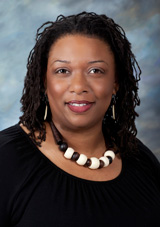Halls of Fame
 Jessica Ayo Alabi, Ph.D.
Jessica Ayo Alabi, Ph.D.
As an Assistant Professor at Orange Coast College in the Dept. of Sociology and Gender Studies, Jessica Alabi stands before students as a role model, a person whose academic and professional career was launched in a community college. She can identify and empathize with their struggles, insecurities and uncertainties – as well as their opportunities. This is why she chose to teach in a community college, it is where she believed she could best help others facing struggles like hers.
Jessica graduated from Santa Ana High School in 1990 with a degree, a scholarship to Santa Ana College, and a job. She lived right around the corner from where we are sitting. “This campus was just an extension of my neighborhood,” she explains.
But she did not know what “college” really was. It had no meaning to her as a place to continue her education after high school.
“I moved here in 1988 from the east coast to live with my father after my parents got a divorce. I felt very comfortable on campus, but I did not understand what Santa Ana College really was all about. “
She explains, “My life has been a series of epiphanies as the world opened up and I discovered that I can learn things and do things I did not know existed. It is all about life enrichment.
“I didn't use the scholarship because I didn't understand what I had been given. I didn't even know how to fill out a college application. I am from a family that values work. When I graduated high school, someone offered me a job, and that's all I knew. It's all I wanted.”
An early epiphany came when she and a friend decided to take classes at Santa Ana College mostly for fun (piano) and maybe to get a better job (Counseling 116), which was taught by Adjunct Professor Sunshine Vidal. “I wanted to be a hairdresser,” she says. A documentary featuring motivational speaker Les Brown provided determination.
He said, “The biggest risk you take in life is taking no risk at all.” Jessica got the message.
Taking classes for fun and to get a better job was a perfect fit with her values and her world view. “For working-class people, the fun classes and the classes that can help you get better jobs can be the best gateway to higher education,” she explains. But she had gotten a glimpse into possibilities for a life much bigger than anything she could have imagined before she took those classes. Or, as Les Brown says, “When you don't know what you don't know, and you think you do know, you aren't open to getting guidance and information from people who do know, who have done things you have not done.”
This was also a time of passionate political activism on campus. “The community was very politicized when I was taking political science classes,” she says. When students demonstrated at the corner of Bristol and 17th Streets to oppose Proposition 187 in 1994, Jessica was among them. And that was just the beginning of her pursuit of social justice “but I had no idea that there were degrees – and careers – in peace activism.”
Then, “One day there was an event on campus, and I stopped at a booth that Chapman had set up. I saw a brochure about classes offered at Chapman University, and about transferring. I went straight from that booth to the transfer center. That was another epiphany. I owe so much to Steve and Sherry and others in the transfer center who coached me through the process.”
That summer she attended the summer scholars transfer program at the University of California, Irvine, a three-unit, 13-day course designed to inspire first-generation college students.
Jessica graduated Santa Ana College in 1997 with a degree in Liberal Arts and cosmetology.
But most important, she graduated with a bigger concept of the world, and the possibilities for her place in it. “I was learning that I could have a life where I was connected to the people who don't have a voice; I could be a community leader.”
This led her first to Chapman University, where she completed her undergraduate work in Peace Studies, Social Justice, and Domestic Conflict Resolution in 1999, then to the University of California, Irvine, where she received her M.A. (Sociology) in 2002, specializing in Inequality, African American social movements, Race and Ethnicity and Social Change, and her Ph.D. (2007) in Sociology, with emphasis in Collective Action, Popular Culture, and the Study of Urban Youth.
In an essay, the psychologist Carl Rogers wrote, “It seems to me that the good life is not any fixed state. It is not, in my estimation, a state of virtue, or contentment, or nirvana, or happiness. The good life is a process, not a state of being. It is a direction, not a destination.”
The process wasn't always smooth, or pleasant but from her own life experiences, she understood that “there are a lot of structures that constrain our choices. When we understand that, we become more empathetic.”
She is one of the few scholars conducting empirical research on Hip-Hop Culture, and its impact on urban youth. She is the founder and director of The Hip Hop University, a grassroots community, research-based organization which seeks to empower urban youth through history, culture and community. This organizations sponsors and facilitates many symposiums, workshops, and retreats that focus on urban youth education and empowerment.
As a professor at a Community College, she believes she can most effectively serve the community in the spirit of the renowned author, intellectual and champion for racial justice Dr. Cornel West, who asserts, “You can't lead the people if you don't love the people; you can't save the people if you won't serve the people.”
Jessica Alabi lives to serve.
